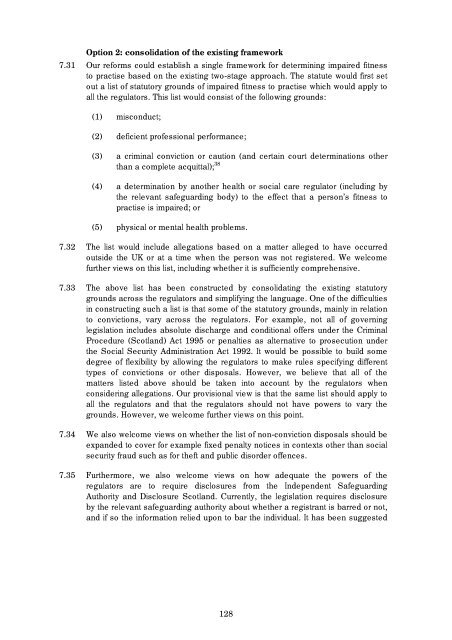Regulation of Health and Social Care Professionals Consultation
Regulation of Health and Social Care Professionals Consultation
Regulation of Health and Social Care Professionals Consultation
Create successful ePaper yourself
Turn your PDF publications into a flip-book with our unique Google optimized e-Paper software.
Option 2: consolidation <strong>of</strong> the existing framework<br />
7.31 Our reforms could establish a single framework for determining impaired fitness<br />
to practise based on the existing two-stage approach. The statute would first set<br />
out a list <strong>of</strong> statutory grounds <strong>of</strong> impaired fitness to practise which would apply to<br />
all the regulators. This list would consist <strong>of</strong> the following grounds:<br />
(1) misconduct;<br />
(2) deficient pr<strong>of</strong>essional performance;<br />
(3) a criminal conviction or caution (<strong>and</strong> certain court determinations other<br />
than a complete acquittal); 38<br />
(4) a determination by another health or social care regulator (including by<br />
the relevant safeguarding body) to the effect that a person’s fitness to<br />
practise is impaired; or<br />
(5) physical or mental health problems.<br />
7.32 The list would include allegations based on a matter alleged to have occurred<br />
outside the UK or at a time when the person was not registered. We welcome<br />
further views on this list, including whether it is sufficiently comprehensive.<br />
7.33 The above list has been constructed by consolidating the existing statutory<br />
grounds across the regulators <strong>and</strong> simplifying the language. One <strong>of</strong> the difficulties<br />
in constructing such a list is that some <strong>of</strong> the statutory grounds, mainly in relation<br />
to convictions, vary across the regulators. For example, not all <strong>of</strong> governing<br />
legislation includes absolute discharge <strong>and</strong> conditional <strong>of</strong>fers under the Criminal<br />
Procedure (Scotl<strong>and</strong>) Act 1995 or penalties as alternative to prosecution under<br />
the <strong>Social</strong> Security Administration Act 1992. It would be possible to build some<br />
degree <strong>of</strong> flexibility by allowing the regulators to make rules specifying different<br />
types <strong>of</strong> convictions or other disposals. However, we believe that all <strong>of</strong> the<br />
matters listed above should be taken into account by the regulators when<br />
considering allegations. Our provisional view is that the same list should apply to<br />
all the regulators <strong>and</strong> that the regulators should not have powers to vary the<br />
grounds. However, we welcome further views on this point.<br />
7.34 We also welcome views on whether the list <strong>of</strong> non-conviction disposals should be<br />
exp<strong>and</strong>ed to cover for example fixed penalty notices in contexts other than social<br />
security fraud such as for theft <strong>and</strong> public disorder <strong>of</strong>fences.<br />
7.35 Furthermore, we also welcome views on how adequate the powers <strong>of</strong> the<br />
regulators are to require disclosures from the Independent Safeguarding<br />
Authority <strong>and</strong> Disclosure Scotl<strong>and</strong>. Currently, the legislation requires disclosure<br />
by the relevant safeguarding authority about whether a registrant is barred or not,<br />
<strong>and</strong> if so the information relied upon to bar the individual. It has been suggested<br />
128
















